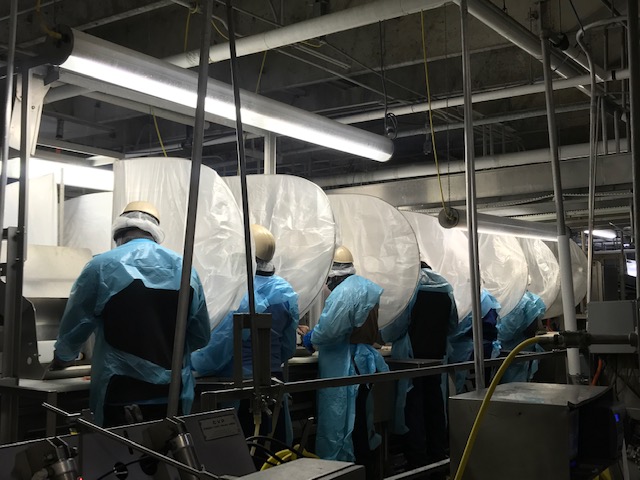Additional protection sought for essential food workers
Heroes Fund would offer premium pay for frontline workers and additional funds for PPE to protect workers.

While initial hot spots of COVID-19 have been centered in urban communities, infections are expanding into rural areas. Public health officials fear that severe testing shortages throughout rural communities are allowing the virus to spread unnoticed. This is particularly notable in meat packing plants, where outbreaks have occurred among essential food supply chain employees.
Senate Democrats released a new report detailing the impact of the COVID-19 crisis on rural America and also called for actions to help minimize the impact moving forward.
“As COVID-19 spreads across the country, rural communities are being hit hard due to the unique challenges they face. We need to do everything we can to support rural families, farmers and businesses and help them address the devastating impacts of the virus. We need our rural communities to survive and thrive,” said Sen. Debbie Stabenow (D., Mich.), who serves as the Democratic Policy & Communications chair and ranking member of the Senate Agriculture Committee.
One of the suggestions from the Senate Democrats includes establishing a “Heroes Fund” for essential food workers. These essential frontline workers are the true heroes of America’s COVID-19 pandemic response. Senate Democrats want to provide premium pay to frontline workers during this pandemic to reward them, ensure the retention of essential workers who are working grueling hours on the front lines of this crisis and promote the recruitment of additional workers who will be needed in the months ahead.
The Heroes Fund consists of two major components: (1) a $25,000 pandemic premium pay increase for essential frontline workers, equivalent to a raise of an additional $13 per hour from the start of the public health emergency until Dec. 31, 2020, and (2) a $15,000 recruitment incentive for health and home care workers and first responders to attract and secure the workforce needed to fight the public health crisis.
Stabenow explained that this would not be paid by food companies or business owners but by another government program to offer support during this time. “They’re the ones on the front lines taking the risks,” she said.
Stabenow also noted that some federal inspectors in meat facilities did not have personal protection equipment (PPE) to protect themselves but had to provide their own. She was “very concerned there wasn’t a plan on the front end” to provide the protection needed for the federal employees as well as the frontline workers.
Since March, the Retail, Wholesale & Department Store Union (RWDSU) has been imploring poultry industry employers like Tyson Foods, Equity Foods, JBS/Pilgrim's Pride, Koch Foods and Wayne Farms to implement critical standards to protect worker safety and to secure the food supply chain. “Our members are scared; they’re terrified that the one job they have that’s keeping their families afloat right now may make them or their families sick or -- worse -- kill them,” said Randy Hadley, president of the Mid-South Council of RWDSU, which represents 15,000 workers across the southern U.S. in food processing, distribution and health care.
Other operations, such as at Perdue Farms, took proactive steps to protect their associates. Where social distancing isn’t possible, Perdue Farms rolled out temporary installations of dividers between associates on production lines. The design of these partitions is such that they can be easily customized and installed in many different applications where needed throughout the production facilities. The stainless elements are welded versus bolted to minimize potential pathogen harborage points. Made using either Plexiglass or stretched trash bags, the dividers will be cleaned or replaced, respectively, between every shift.
“Additional preventative measures include temperature checking at all production facilities as well as rolling out a disposable mask program, which will be available at all production facilities,” Perdue Farms chief executive officer Randy Day explained.
Earlier in the week, Stabenow led a group of 36 Senate Democrats in writing a letter urging Vice President Mike Pence to take additional precautions to protect the food supply and essential workers.
“It is vital that we do everything we can to protect food supply workers,” the senators wrote. “Breakdowns in the food supply chain could have significant economic impacts for both consumers and agricultural producers. It is also imperative that precautions are taken to ensure the stability and safety of our food supply.”
There have been numerous reports of essential workers in meat packing plants, processing facilities, farms, grocery stores and markets falling ill from COVID-19. Some workers have reportedly felt pressured to go to work even when they feel sick. There are also serious concerns about the health of farm workers who often live, work and travel in close proximity, making social distancing very difficult.
“The severe shortages of adequate COVID-19 testing capability and personal protective equipment are exacerbating these problems,” the senators wrote. “Lack of access to tests and personal protective equipment leaves essential food supply workers at even higher risk and makes the virus more likely to spread, harming more workers and further damaging our food supply chain.”
The senators urged the White House and federal agencies to coordinate with state and local governments and the private sector to take aggressive action to protect essential workers and the food supply from further damage. The senators also asked a series of questions about the actions being taken and coordination with the food industry.
Families in rural communities face disparities that put them at high risk and increase the challenges of addressing the pandemic, including: under-resourced health care systems, high rates of chronic health conditions, lack of access to reliable high-speed internet, vulnerable economic conditions and greater food insecurity.
About the Author(s)
You May Also Like





